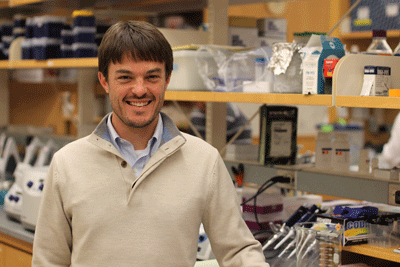 |
|
|
Read Pukkila-Worley, MD |
The human body’s innate immune system works to stop dangerous infections before they begin. But how innate immune defenses do this and how those mechanisms might be manipulated to ensure that deadly infections or serious inflammatory diseases don’t take hold is not well-understood by scientists.
With a new five-year, $2.1 million grant from the National Institutes of Health, infectious disease physician-scientist Read Pukkila-Worley, MD, will advance the understanding of how intestinal epithelial cells—the cells that line the intestine—recognize when we are under attack by bacterial pathogens.
“We are focused on the fundamental mechanisms by which intestinal epithelial cells engage protective host defenses. How do these cells distinguish between the beneficial microbes always present in our intestinal tracts and ingested pathogens, and then mount targeted immune responses only in the context of infection?” said Dr. Pukkila-Worley, assistant professor of medicine in the Division of Infectious Diseases and Immunology. “The answer to this question will shed a light on our understanding of disease pathology, particularly why some patients are at heightened risk for acquired infections and also why others suffer from debilitating inflammatory disorders, such as inflammatory bowel disease.”
A practicing physician as well as a scientist, Pukkila-Worley sees the ill effects of infections from bacterial pathogens all too often. The digestive tract is often a source of infection in patients who are hospitalized, particularly those who have compromised immune systems, such as cancer patients hospitalized for a long periods while undergoing chemotherapy. “The intestinal epithelium provides a critical barrier against these pathogens to prevent them from translocating into the blood stream,” he said. “But when these mechanisms break down, people can get sick.”
Pukkila-Worley’s first R01 grant from NIH follows related findings he made in preliminary studies funded by the Hood Foundation. The hypothesis for his NIH grant is that intestinal epithelial cells possess the mechanisms to monitor physiological processes that, when they are perturbed, provide a cue that these cells are under attack. “We anticipate that this work will offer insights into the activation and regulation of innate immune defenses that will be of fundamental relevance to humans,” he said. “My hope is that advances in our understanding of immune defense mechanisms will lead to the discovery of new therapies that can benefit patients at risk for bacterial infections.”
Related story on UMassMedNow:
Trudy Morrison, PhD, and Read Pukkila-Worley, MD, awarded Hood Foundation grants